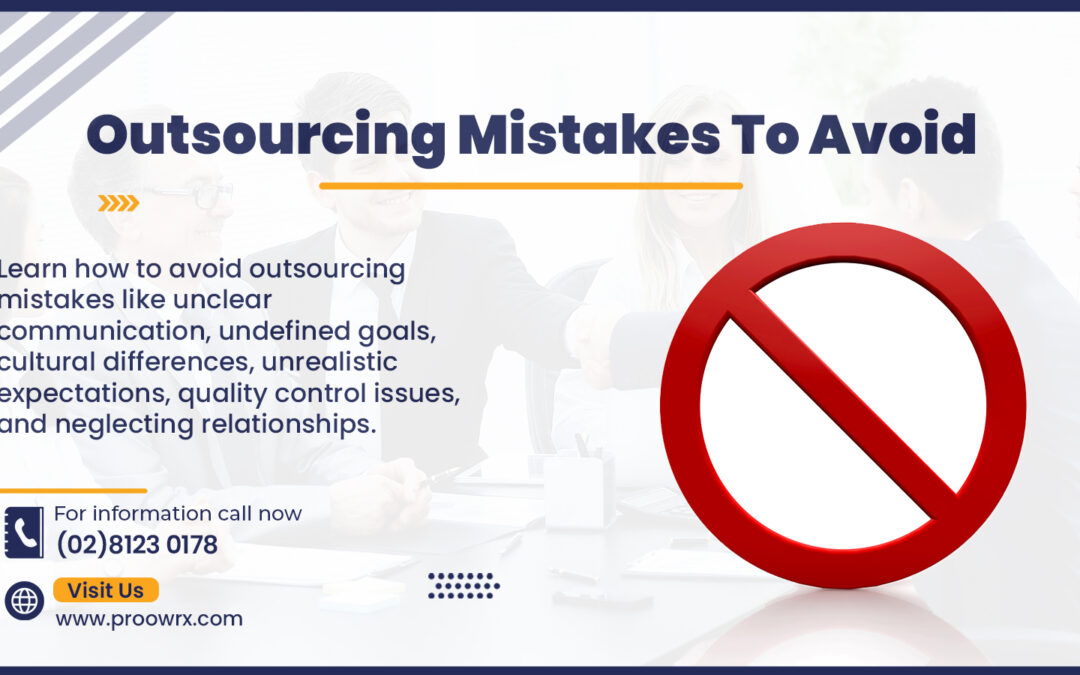When the company grows, the dynamics shift. Even in huge teams, tasks can become overwhelming to handle, making it difficult to finish work in every department. The solution, as you might expect, is to outsource to a third-party service provider. You free up some time so that decision-makers can concentrate on the matters that require their full attention. Outsourcing is practically associated with cost reductions, greater flexibility, increased efficiency, and access to specialized experts. Furthermore, using a third-party provider makes it simple to maintain an advantage over competitors and accelerate processes. Let’s explore some major outsourcing mistakes to avoid and how to mitigate them to help you avoid these typical pitfalls.
Inadequate Communication
The foundation of a good outsourcing relationship is effective communication. However, one of the most frequent mistakes is not opening up clear channels of communication immediately. When expectations are not clearly stated, misunderstandings may occur, which can cause mistakes, holdups, and frustration for all parties.
Take the time to create reliable channels and procedures for communication in order to prevent this mistake. Project goals, expectations, deadlines, and deliverables should all be clearly stated. Throughout the course of the project, regular check-ins and status updates can help guarantee that everyone remains in alignment.
Lack of Defined Goals and Objectives
Ambiguity leads to confusion, and this is especially true in outsourcing arrangements. Without well-defined goals and objectives, there’s a chance that neither party will know what success looks like or how to get there. Because of the possibility of misdirected or redundant efforts, this lack of clarity can lead to time and resource waste.
Take the time to create specific, measurable, attainable, relevant, and time-bound goals for every outsourcing project in order to avoid making this mistake. Make sure that everyone is in agreement about these goals and the assessment criteria. To monitor your progress and make any required course corrections along the way, go back and evaluate your goals on a regular basis.
Failure to assess results
It is essential that you, as a business owner, assess the quality of service and outcomes your business receives. Depend on it without delay.
Are you getting the level of service that you expected? Are you meeting your goals as planned? Is it possible for your outsourcing partner to help you assess whether the outcomes or service you received fulfilled your expectations or not?
Talk about your issues without holding back. Together with your outsourcing partner, identify the areas that require improvement and work together to build workable solutions. Have faith in your gut and let your analysis guide you toward wise decisions.
Overlooking Cultural Differences
Working with individuals or teams from many cultural origins is a common aspect of outsourcing in the modern, globalized world. Although diversity has its advantages, it may also cause miscommunication, conflict, and lower productivity when cultural differences are ignored.
Spend some time getting to know the communication styles, cultural norms, and values of your outsourcing partners in order to help you avoid making the same mistakes twice. Encourage an environment of tolerance and diversity, and facilitate honest communication to clear up any possible miscommunications. You can create a more welcoming and cooperative workplace by valuing diversity and taking advantage of the distinctive viewpoints of your outsourced partners.
Failure to Manage Expectations
Any outsourcing engagement requires effective expectation management. On the other hand, disappointment and discontent on both ends might result from failing to manage expectations properly during the project lifecycle or from setting unrealistic expectations.
Be open and honest about what can actually be accomplished within the specified time, money, and resource limits in order to avoid making this mistake. Avoid overpromising and under-delivering, as this can erode trust and damage the outsourcing relationship. Instead, strive for realistic and achievable outcomes, and communicate openly and honestly about any challenges or obstacles that may arise along the way.
Insufficient Quality Control
Quality control issues can occasionally arise from outsourcing, especially when collaborating with distant teams or third-party partners. Deliverables run the danger of falling short of the required standards or specifications if appropriate oversight and quality assurance procedures aren’t in place.
Implement strong quality control systems and procedures to guarantee that work satisfies the necessary standards of accuracy and quality in order to rectify this error. This could entail carrying out exhaustive testing and validation, reviewing work on a regular basis, and giving outsourcing partners helpful criticism so they can keep becoming better over time.
Failure to adhere to the contract terms
Every outsourcing arrangement is subject to the maxim, “Never sign a contract unless you fully understand what it entails.”
An essential contract that governs the entire outsourced collaboration is the outsourcing contract. Read the tiny print carefully, since it outlines the terms and restrictions. Additionally, your contract serves as a guide for both parties to successfully complete the outsourcing process.
Ignorance of critical elements including intellectual property rights, pricing policies, service-level agreements, and termination clauses could lead to unexpected expenditures and harm later on.
Neglecting to Build Relationships
While outsourcing may appear to be a transactional process, the most effective collaborations are based on solid relationships and trust. In the long run, outsourcing initiatives may not be successful if time and effort are not dedicated to developing these partnerships.
Prioritize developing relationships from the beginning of any outsourcing engagement to avoid making this mistake. Spend some time getting to know your outsourcing partners personally, encourage honest and open communication and show that you are invested in their success. Building solid bonds based on respect and trust can help you create the groundwork for successful long-term cooperation.
Final Words
For companies seeking to increase productivity, creativity, and expansion, outsourcing can be a highly successful strategy. However, it is not without difficulties, though. You can raise your chances of outsourcing success by avoiding common outsourcing mistakes like poor communication, unclear goals and objectives, ignoring cultural differences, failing to manage expectations, inadequate quality control, and failing to establish relationships. You may fully realize the benefits of outsourcing as a strategic business tool by proactively addressing these possible risks and putting the highest standards for outsourced management into practice.
By putting time and effort into developing connections, you lay the groundwork for mutual understanding, trust, and effective communication by investing time and energy into building connections. You make it easier for people to work together, solve problems, and align goals and strategies.
Ready to outsource Visit our website. Contact Proowrx! Book a Discovery call today.

